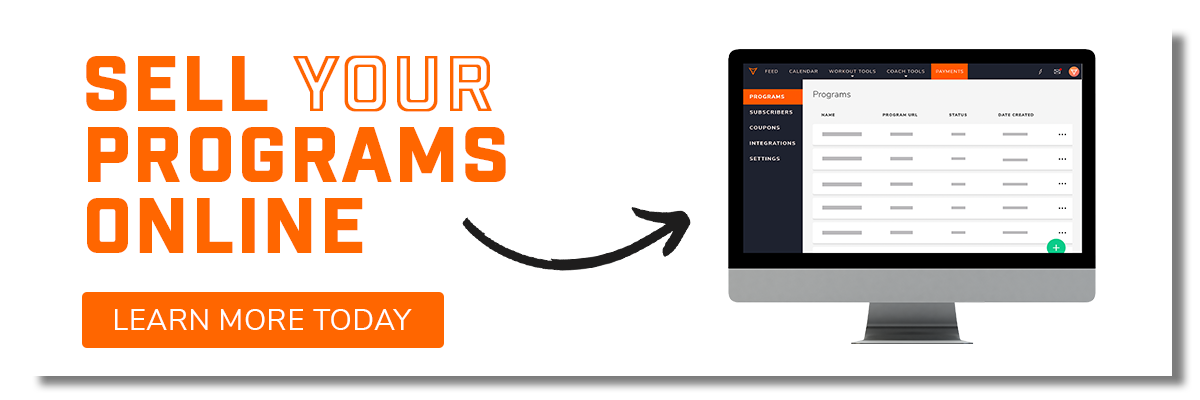Entrepreneurship Skills in Strength & Conditioning
I wanted to write this article for 2 reasons:
- I was completely broke as an up-and-coming coach fresh out of college. While these were some of the most rewarding times in my life where I came out stronger thanks to the struggle, they were also some of the most stressful. I found any job that I could take on to make ends meet, which included jobs like a bouncer in a bar, cleaning up lawns at concerts (AKA the worst job ever), and even a designated driver job where I drove a foldable scooter, folded it up and placed it into the customer’s trunk, and drove their car home for them. Then I took my scooter out of their trunk and was back to scooting on the open roads. That job nearly killed me.
- I realized there’s an entrepreneur in all of us and there had to be a better way than throwing intoxicated patrons out of a bar. I could only “Roadhouse” my way through life for so long.
"Entrepreneur is someone who has a vision for something and a want to create." -David Karp
I love this quote because every individual I’ve ever met who works in strength and conditioning embodies these two attributes. We typically have a vision for how to structure the program to ensure the training is improving the qualities the athlete needs for the sport. We have a desire to create the best training environment for each training session, so the athlete feels inspired and motivated to succeed.
In today’s society, an entrepreneur is often associated with direct financial benefits and risk, and this is where it becomes unsettling for strength and conditioning coaches since money is still a taboo subject for many. We often don’t have the vision for our personal wealth or feel the need to create it since we love the work we perform. However, if the pandemic has taught us anything, it’s important to have multiple streams of income as coaches. My goal in this article is to provide the reader with an understanding of multiple streams of income that may be available to coaches and how to begin implementing these strategies immediately.
Having multiple streams of income is simply deriving income from several sources. Like investing and saving money, you’ll want to diversify your income. First, let’s talk about the strategies that are like your day-to-day job as a coach and how you can capitalize on your time and knowledge:
Personal Training
I often talk with other coaches who are moonlighting on the side as a personal trainer. They are training friends or family, administration, or general population clients through networking in their community. From my own time moonlighting as a personal trainer and working as a college S&C coach, one thing is for certain: clients love to brag that they are training with a strength and conditioning coach who trains athletes for a living! Typically these clients see you as an expert due to your level of education and title which allows for 2 opportunities: the ability to charge a higher rate for your time and increased likelihood of adherence.
As a strength and conditioning coach, it’s likely that you possess a Bachelor’s degree in a related field, hold a CSCS, completed a Master’s degree, and spent years training athletes in the trenches. This immediately sets you apart in a world where weekend certifications to become a personal trainer are the norm. In my experiences, your clients will value your attention to detail, your commitment to continuing education and your highly trained eye in ensuring movements are performed correctly. Because of your experience level as well as your education, you should feel comfortable charging more than what an average personal trainer is charging in your area. You deserve to be compensated for your time, as well as the time and effort spent perfecting your craft over the years. Consider running a Google local search and collect data on what normal rates are for personal training in your area. This information should be helpful as you structure your session rates.
Your education is likely well-diversified as you have knowledge in mobility, flexibility, strength, power, endurance, hypertrophy, nutrition, hydration, and sleep. Many clients will not realize this and only think you are there to provide a workout that makes them sweaty in the moment. Demonstrate your value and knowledge in these areas. You can completely change a person’s life since they often have no understanding of these areas and how to incorporate them into a daily routine.
Showing your value often increases the client’s likelihood of following the plan, especially once they notice results in their physical appearance, energy levels, and mindset.
The main drawback with personal training is that you are trading hours for dollars. With your schedule, personal training sessions will likely occur very early in the morning, late in the evenings after an already long day, or on the weekends. Also, you may have to deal with client cancellations and schedule changes. Working with general population often requires more time and patience since many clients do not have an athletic background. You may already be feeling spread thin due to all the roles held by a strength and conditioning coach and you may not want the extra stress that comes with balancing clients as well as a full-time job. Ultimately, it’s your decision if it’s worth your time to make extra money on the side.
Online Training
Online training is a platform of the digital world that has taken off in the last 10 years, and the pandemic only helped to popularize this style of training. Thanks to a platform like TeamBuildr, the ability to provide a client with a detailed training program with video demonstrations and the ability to track meaningful data is easier than ever. Online training has many of the benefits of in-person training listed above, without having to trade as many hours for dollars. It still requires a lot of time and may require more time and patience answering questions, but often you can work from the comfort of your own home. Because there is no in-person teaching, your rates will likely be much lower than what you can charge for in-person sessions. However, you can have more clients since you are limited by schedule with in-person sessions.
The online training world is vast and everyone claims to be a fitness coach on social media. My advice if you decide to choose this route: find a target audience and direct your social media posts and marketing towards that audience. While you possess the knowledge to work with a wide range of clients, it will be easier to find clients interested in a specific niche. For example, you work as a strength and conditioning coach for bowling. Creating posts on strength training that can improve a bowler’s performance is a great way to bring traffic your way since there isn’t much information available regarding strength training for bowling.
Demonstrating your expertise in one area will likely demonstrate your overall knowledge as an expert in training, which will result in more overall traffic coming your way.
Although online training sounds amazing, you may find that it starts to take up more of your time than in-person training and is not worth the cost you are charging. You will need to develop a system regarding check in’s and communication, so you aren’t spending all day responding to text messages and emails. However, when implemented correctly, I believe online training can be a nice supplement in income for most strength and conditioning coaches.
If you choose to do either route listed above, it’s a good idea to consider creating an LLC for your side hustle. Having an LLC registered in your name protects your personal assets if a business is sued. It’s better to be safe than sorry if something catastrophic happens.
Now that the scary stuff is out of the way, let’s talk about how having an LLC can help you immediately. Having an LLC will increase credibility in the eyes of your clients. In the event you ever wanted to scale your business, an LLC will also give you more credibility in the eyes of a bank or lender.
Even if you don’t see yourself wanting to scale or you don’t care about the credibility, the tax benefits associated with having an LLC can prove to be very helpful for a strength and conditioning coach. Some expenses you may be able to write off as an LLC are possible areas you are already paying out of pocket and can help save you some money: continuing education expenses like books or conference events, insurance, materials and supplies like equipment and clothing for client sessions, and even a portion of your cell phone or internet bills if you are tracking how your time is spent on your business.
Next are some options that can potentially result in residual or passive income where you aren’t having to trade as many hours for dollars:
Online Affiliate Sales
Before I mention different options, I need to mention a big caveat; be careful selecting the products and companies you promote. It can take years to build a solid reputation, and seconds to ruin that reputation if you are associated with products that are fake or dangerous or with a company that lacks integrity. Do your research. Additional income is not worth risking your reputation or ruining a relationship with someone.
How often are you asked this question: what brands of equipment should I buy? Fitness equipment companies almost always have an affiliate or partner program and will offer a percentage on commissions. If the person who is asking is going to buy the equipment anyway, you can mention you have a referral code where you may make a small percentage off the order and they may save money by using your code. It’s a win/win for everybody.
Supplements are a little trickier since you must know that the company ensures high quality and fair pricing and this information isn’t always readily available. However, I believe that companies exist with good products and fair prices. Again, you need to do your homework here. Only recommend what the person needs and educate them about all options available.
E-books/Pre-made Training Programs
If you are a coach with less than 3 years of coaching experience, you probably shouldn’t be creating an e-book. However, you may find yourself in a situation with a very specific niche and you feel like you can help more individuals by monetizing this content. The cost of producing this type of digital material is relatively low. Also, you can outsource a freelancer to make it look fancy and professional which saves you more time and effort as well. Selling 1 e-book or program will likely make you back the money you spent to outsource the production cost. Having this option available can potentially add up quickly in profit over time.
Writing
Many of the most famous strength and conditioning coaches of all time reached their fame through writing. Strength and conditioning is still a very new profession, and although the delivery of content is drastically changing, there is a need for evidence-based articles. Writing for a well-known website can help build your career currency, as well as help build your name. You can make a little extra money which is a nice touch as well.
Swag
It’s pretty cool when you see a friend of yours rocking a t-shirt with the logo of your company. Although I don’t believe you can make any serious money from having apparel, it may throw a few bucks into your pocket while helping to build your brand. If you followed my directions from the first section and created your own LLC, this could be a great way to help spread the word about your training business and the content you have available. I recommend using a print-to-order website where they manage and fulfill orders for you. The additional stress of packing and sending apparel through the mail isn’t worth a trip to the post office every few days.
I hope this article gives you a better understanding of some of the options for additional streams of income that may be available to you. I hope this article also allows you to tap into your entrepreneurial spirit. As a coach, you already possess a vision and a desire to create; now take these suggestions and begin creating some financial freedom for yourself.
Subscribe to our blog
Subscribe to receive the latest blog posts to your inbox every week.
Related posts

Scaling your Side Hustle

5 Things Every Coach should Know About the Strength & Conditioning Industry


